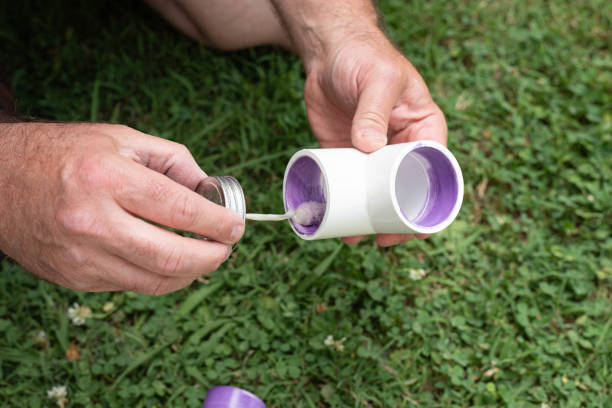
In plumbing and construction, even the strongest PVC pipes are only as good as the joints that hold them together. That’s where PVC solvent cement plays a critical role. Whether you’re working on a residential plumbing system, an irrigation line, or an industrial pipeline, using the right adhesive ensures a secure, leak-free fit that lasts for years. At Unitrade, we provide high-quality PVC solvent cement designed to deliver reliable results across various applications.
What Is PVC Solvent Cement?
PVC solvent cement is not a traditional glue. Instead of simply sticking two surfaces together, it chemically softens the surfaces of PVC or uPVC components, fusing them into a single, solid piece. This process is known as solvent welding. When properly applied, the joint becomes as strong as the pipe itself—if not stronger.
PVC solvent cement is commonly used for PVC, CPVC, and uPVC materials, making it a staple in water supply systems, drainage systems, and industrial applications where durability is essential.
How Does PVC Solvent Cement Work?
The bonding process begins when the solvent cement is applied to the prepared pipe and fitting. The chemicals in the cement temporarily dissolve the surfaces, allowing the molecules to merge. As the solvent evaporates, the material hardens and forms a permanent bond.
- Setting time usually takes a few minutes, depending on temperature and humidity.
- Full curing may take 12 to 24 hours before the joint is ready for pressure testing or water flow.
Benefits of Using PVC Solvent Cement
Using high-quality PVC solvent cement provides several advantages:
- Leak-proof sealing: Once cured, the joint offers superior resistance to leaks, even under high pressure.
- Durability: The chemical bond resists vibration, impact, and temperature fluctuations.
- Quick application: With fast drying and minimal tools required, solvent cement speeds up installation.
- Cost-effective: Fewer fittings and clamps are needed, lowering material costs and labour time.
These benefits make it ideal for both DIY plumbing projects and large-scale commercial installations.
Applications in Residential, Commercial, and Industrial Plumbing
Solvent cement sees wide usage across sectors:
- Home plumbing: Ensures secure pipe joints for bathrooms, kitchens, and water tanks.
- Agricultural and landscaping: Used in irrigation systems where pressure stability is key.
- Industrial piping: Applied in chemical transport and wastewater management where chemical resistance is crucial.
- HVAC systems: Bonds ventilation and drainage pipes in air conditioning and cooling systems.
How to Use PVC Solvent Cement Effectively
To get the best results:
- Clean the surfaces of the pipe and fitting using a cloth or cleaner.
- Deburr and dry-fit the connection to check alignment.
- Apply primer if recommended, especially for CPVC or pressure applications.
- Brush on the cement evenly around both surfaces.
- Push and twist the pipe into the fitting and hold for a few seconds.
- Allow time to cure fully before applying pressure or turning on the system.
Always work in a well-ventilated area and follow safety precautions on the product label.
Why Choose Unitrade for PVC Solvent Cement?
UNITRADE is one of Malaysia’s leading suppliers of plumbing and piping materials, trusted by contractors, engineers, and homeowners alike. We offer:
- Premium-grade solvent cements compatible with standard PVC and uPVC systems
- Competitive pricing and volume discounts
- A wide range of pipe fittings and accessories
- Professional support to help you choose the right bonding products
Conclusion
Whether you’re sealing a water line or installing a complex piping system, using the right solvent cement ensures strength, safety, and long-term performance. At Unitrade, we supply trusted solutions that meet industry standards and deliver consistent results. Explore our full range of PVC joining solutions today and get expert help for your next project.




